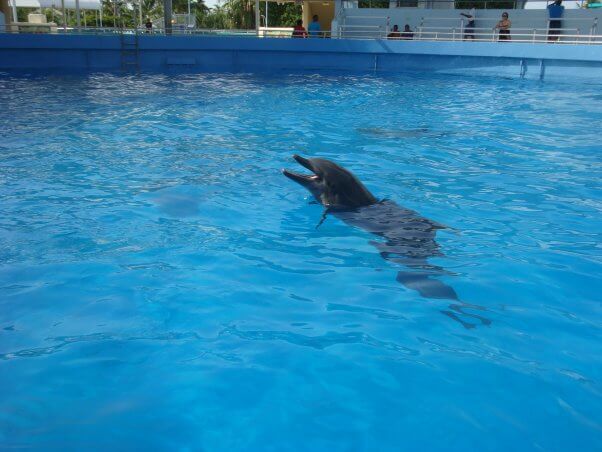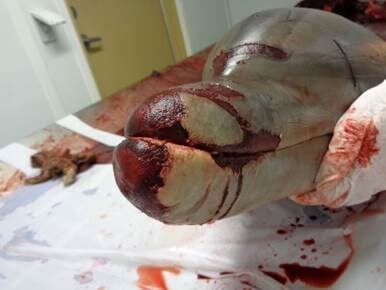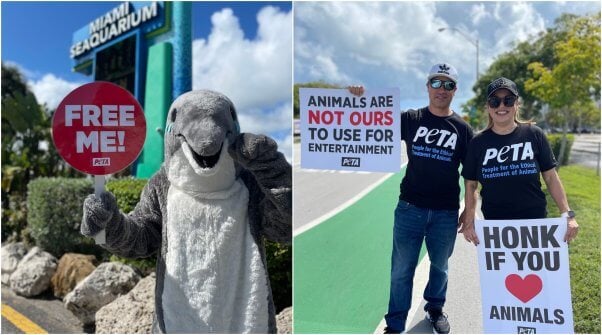Hot off the Press: Damning E-Mails Released Concerning Hellhole Miami Seaquarium
Multiple U.S. Department of Agriculture (USDA) reports underscore the Miami Seaquarium’s perpetual failure to provide adequate veterinary care, sufficient staffing, safe and well-maintained enclosures, and appropriate environmental enrichment for the animals housed there.
Most recently, according to e-mails just obtained through a public records request, the facility’s veterinary staff were unable to provide even the minimum standards of animal care due to financial concerns.
The e-mails from veterinary staff to management reveal the following:
- The facility owed “significant amounts of money” to multiple veterinary labs, including over $26,000 in at least two cases.
- Vet staff were working at 20% capacity and were reportedly not allowed to fill the open positions.
- Staff members were running out of medications but unable to reorder many of them because of the inability of the facility outstanding bills. Instead of reordering medications, vet staff were asked “to try and use whatever medications we have in house,” even though “most medications cannot just be replaced by an alternative.”
- Vet staff were worried that a dolphin named Onyx was going to have a “recurrence of his historical gastric disease” but were unable to diagnose it properly without ultrasound equipment.
The Miami Seaquarium is understaffed, in debt, and failing to provide necessary care for the animals it exploits. Vet staff acknowledged this urgent issue, saying, “At this time we are reaching a point that we cannot even meet the US minimum standard of veterinary care for the animals …. [W]e are very worried about the level of care we are currently providing.”
Until this hellhole closes down, people should stay far away and urge others to do the same. Keep reading for more updates about this crummy abusement park.

Updates on the Miami Seaquarium
March 2024: The Miami Seaquarium’s Lease Ordered to Be Terminated
In March 2024, Miami-Dade County ordered the Miami Seaquarium to vacate by Sunday, April 21, but the facility claimed it would fight the decision. County officials are moving forward with the eviction process.
February 2024: Reports of the Veterinarian’s Resignation
In February 2024, outlets reported the impending resignation of the sole attending veterinarian at the Miami Seaquarium, which was cited in November 2023 for, among other animal-care failures, having only one veterinarian responsible for the care of 46 marine mammals, 50 birds, and hundreds of fish.
January 2024: Federal Inspectors Found Dilapidated Enclosures and Other Repeat Issues
In January 2024, inspectors found the following hazards at the facility, all repeat concerns that were not remedied after previous citations were issued:
- Sharp metal, rust, crumbling drywall, and mold in the building housing penguins
- Broken concrete in dolphin enclosures, which poses a danger to the animals, who are known to have ingested foreign objects in the Miami Seaquarium’s tanks
- Perimeter fence defects that could allow animals and unauthorized humans into the park
- Rust and flaking paint in the “Tropical Wings” section of the park, which pose injury risk to the birds
- Bacteria levels in the sea lion pool so high that it was unsafe for divers to even clean the enclosure (The bacteria pose a serious threat to the health of the animals.)
Two other USDA inspection reports detailed the Miami Seaquarium’s failure to provide appropriate veterinary care to sea lions Sushi and Bud as well as dolphins Bimini and Aries and how it impeded a USDA inspection. The agency had likely planned to confiscate these four animals before accepting the Seaquarium’s delayed corrective action plan.
The reports exposed the marine park’s lack of even basic care for animals:
- Sushi, a California sea lion, had to be euthanized after suffering immensely since at least September, losing 52 pounds in that time. During the inspection, she lay in her enclosure with sunken eyes and didn’t move when approached.
- Bud, a sea lion who was euthanized in March, also didn’t get the care he needed. The USDA noted, “Without appropriate resources, the veterinary staff is unable to maintain the proper level of care to relieve this animal from suffering and this lapse may ultimately lead to his death.”
- Bimini, a dolphin, had multiple rib fractures in various stages of healing, likely from attacks by incompatible tankmates, causing persistent pain and suffering. The recommendations for her treatment plan from four months prior weren’t addressed due to insufficient staffing and other cases that were deemed more critical.
- Aries, another dolphin, was very thin, and staff still had not ordered him appropriate food. All his teeth were apparently eroded; his left eye was closed, indicating pain; and staff left his regurgitation problem unaddressed.
- Because the only attending veterinarian had to focus on more critical cases, some animals at the Seaquarium went without routine and preventive care for over a year.
The Miami Seaquarium was also issued a repeat critical citation for having an insufficient number of adequately trained staff to care for the animals at the facility and a critical citation for “[d]elaying the inspection process and eliciting fear and intimidation towards facility employees.” On the first day of a two-day inspection, the facility refused the inspectors access for a walkthrough for more than four hours. The following day, it implemented new policies that required facility staff to video record the inspection process—which Seaquarium staff admitted made them uncomfortable and caused them to omit “the whole truth as they were not comfortable to be forthcoming with all the relevant details” on camera.
November 28, 2023: Feds Issue Citations Over Inadequate Veterinary Care, Poor Enrichment, and Other Issues
- A manatee named Clarity, who has since been removed and sent to SeaWorld, appeared to have a progressive skin condition at the time of the inspection. She was covered with a “thick layer of algae” and had “patchy white discolorations around her nostrils, mouth, and face.” The white patches had apparently grown in size and spread over several weeks, but the attending veterinarian was unable to examine her condition properly due to a lack of appropriate facilities and equipment.
- Several dolphins—Ripley, Panama, Onyx, and Sundance—showed signs of gastric distress. The attending veterinarian noted that some of the dolphins may suffer from ulcers and/or have ingested foreign objects—but the facility had yet to provide the equipment needed to diagnose and treat the suspected conditions properly.
- The facility still didn’t have enough staff to care for the animals, for which it had previously been cited. A single veterinarian was responsible for the care of 46 marine mammals, 50 birds, and hundreds of fish. As a result, the veterinarian had to postpone routine physical exams for several months in order to prioritize the animals in need of urgent care.
- The Miami Seaquarium had failed to provide a special enrichment plan for two macaws who had plucked each other’s feathers out—a common sign of psychological distress—and a parrot who had torn their own feathers out.
- The penguin enclosure had black mold growth, peeling paint, crumbling drywall, and multiple rusted areas.
- The wall behind a trailer housing several parrots was damaged from a parrot chewing through the metal bars, likely out of frustration or anguish. A “strong noxious” odor emanated from the trailer due to insufficient ventilation.
- Multiple dolphin pools had broken concrete, creating rough edges that could injure the animals.
November 2, 2023: Feds Cite the Facility Over Inadequate Staff and Other Issues
The USDA inspected and cited the Miami Seaquarium again for still not having enough staff members to care for the animals imprisoned there. The dump failed the animals, and the U.S. Fish & Wildlife Service (FWS) directed the relocation of three suffering manatees who had been held there.
The citation followed a prior inspection in mid-July 2023 at the Seaquarium, which revealed understaffing issues and established a deadline of October 25 for correcting the problem. However, the notorious facility failed to hire enough adequately trained employees by the time feds inspected it again in early November. After the Seaquarium’s only veterinary technician resigned, it had only two veterinarians on staff. These employees were responsible for the care of 46 marine mammals, hundreds of birds, as well as fish, sharks, and rays. No full-time support staff were available, either. The veterinarians were still unable to perform routine and preventive exams and had to keep prioritizing sick and urgent cases until additional staff could be hired.
In December 2021, FWS had directed the Seaquarium to transfer other manatees out of the facility because of its inability to care for them and blocked the Seaquarium from acquiring more rescued manatees due to its abysmal record—including the death of Snuggles, an emaciated manatee whose necropsy showed an empty gastrointestinal tract. The Seaquarium has proved that it’s either unwilling or unable to comply with even the minimum standards of the federal Animal Welfare Act—confining animals to tiny, dilapidated concrete tanks and even starving them to force them to perform tricks for food.
On November 6, 2023, PETA wrote to Miami-Dade County’s mayor and commissioners to urge them to terminate the Miami Seaquarium’s lease in light of another USDA inspection report documenting that conditions at the facility violate the bare minimum standards of the federal Animal Welfare Act. The Miami Seaquarium was cited many times by the feds prior to this disclosure, leading to this push from PETA.

Most notably, the USDA issued the Seaquarium a repeat citation for failing to maintain enclosures in good repair, a critical citation for housing a dolphin with others who apparently had broken several of her ribs and for holding a manatee without another member of his species, and citations for failing to provide protection from direct sunlight and allowing a dolphin trainer to undermine the attending veterinarian’s authority.
Enclosures in a state of disrepair pose a safety and health risk to the animals. The enclosure for Elelo, a Pacific white-sided dolphin, had a layer of broken, flaking concrete, some of which the dolphin ingested along with a plastic zip tie and some other plastic that the Seaquarium uses and introduced into the area. Months later, Elelo vomited sand and glass filtration media.
The Seaquarium has ignored the attending veterinarian’s recommendations, including one to relocate Elelo after he ingested those materials. In 2022, the attending veterinarian wasn’t consulted before some diets were decreased, to the point that animals became emaciated.
October 16, 2023: Inspection Report Reveals Debris in Enclosures and Other Issues
The report included serious failures that directly interfered with animals’ medical treatment. The facility’s attending veterinarian wasn’t given some of the basic equipment needed to provide animals with necessary care. The facility also failed to ensure that the veterinarian had appropriate authority and failed to follow the veterinarian’s treatment instructions, including for a sea lion who needed cataract surgery and began refusing food due to eye pain.
The USDA also found the following:
- Some dolphins at the Miami Seaquarium had dangerous foreign objects in their mouths and throats, including a 2-inch nail, a broken bolt, and small pieces of shell.
- A dolphin was kicked in the mouth by a customer during an interaction.
- A dolphin jumped the barrier between pools and joined another social group. (A dolphin sustained several broken ribs in a similar incident at the facility in the past.)
- Several enclosures were once again found to be dilapidated and/or containing rust, mold, and bubbling paint.
September 27, 2023: Feds Cite the Facility Over Understaffing and Animal-Safety Concerns
The Miami Seaquarium was cited over understaffing issues and animal-safety concerns in a damning federal inspection report by the USDA that was made available following a July 2023 inspection.
Miami-Dade County officials assured the public that things would change at the Miami Seaquarium—where the long-suffering orca Lolita died in a tiny tank—yet this USDA report proved that animals there continued to suffer.
The feds cited the Miami Seaquarium for creating a stressful environment for humans and other animals. The notorious facility was cited for apparently doing the following:
- Having vacancies in vital staff positions, including veterinarian and vet tech roles, which left a single veterinarian responsible for the care of almost 50 marine mammals and hundreds of birds, fish, and other animals
- Failing to prevent a dolphin from biting a patron’s hand during an interactive session
- Allowing a dolphin to ingest plastic, sand, glass filtration materials, and a chunk of cement from a deteriorating tank
- Failing to provide a manatee kept in isolation with adequate shade from the sun
- Housing a dolphin with incompatible tankmates, leading to the animal sustaining multiple bilateral rib fractures
The county must break the Miami Seaquarium’s cycle of abuse. PETA is calling on officials to shut the facility down and ensure that the dolphins and all the animals there are sent to sanctuaries, where they would finally start recovering from their lifetime of trauma and get the care they so desperately need.

What You Can Do
Stay a nautical mile away from this—or any—greedy and incompetent marine abusement park. Urge officials to shut down the Miami Seaquarium over animal safety concerns and send the remaining animals there to reputable sanctuaries:

